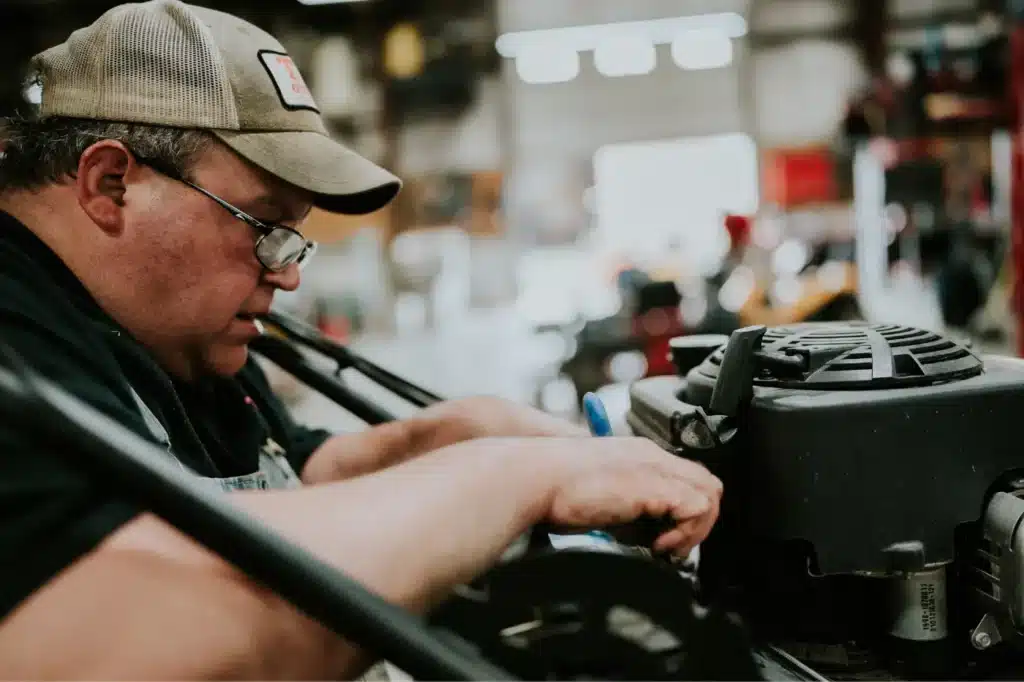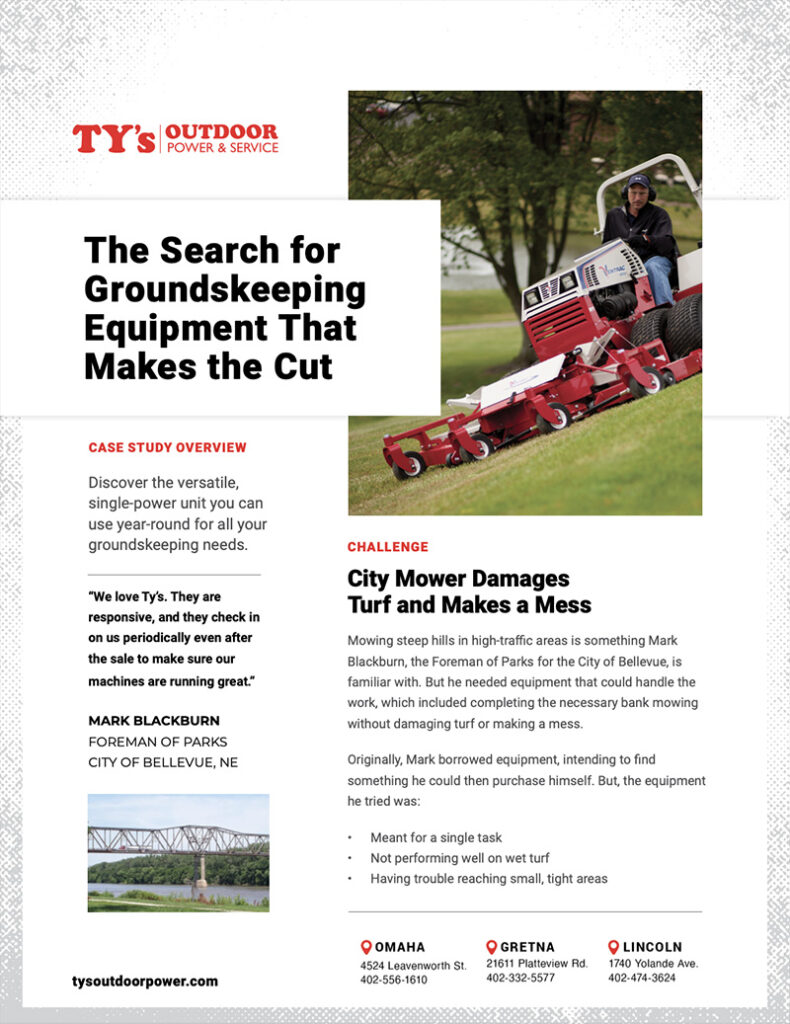If you take good care of your commercial outdoor power equipment, it’ll take good care of you, your customers, and your business. As with most things, an ounce of prevention is worth a pound of cure: regular maintenance and good old-fashioned observation can help you and your crew spot potential problems with your outdoor power equipment before they result in failure.
You’ve made a sizeable investment in your fleet, so make sure your equipment remains reliable and operates at its best to get a longer lifespan and more bang for your buck.
Here are a few tips from the small-engine experts at Ty’s Outdoor Power:
Start By Inspecting Your Equipment From the Ground Up
Quick, regular inspections of your outdoor power equipment will give you a leg up on normal wear and tear. After each day of service, start at the ground level and work your way up to the handle grips.
- Inspect the tires or wheels for signs of wear or damage. Check for any punctures, bulges, or uneven tread wear. Properly inflated and intact tires are essential for maneuverability and stability while operating your equipment.
- Look closely at the blades of your lawn mower or other cutting tools or the tines/teeth, depending on what you’re looking at. Inspect for any chips, cracks, or dullness, as these can impact the equipment’s efficiency and effectiveness. Sharpen or replace blades, tines, and teeth as necessary to ensure a clean and precise cut.
- Check the power cords, cables, or spark plug wires for any signs of wear and tear or animal activity, such as frayed wires or exposed conductors. If you notice any damage, you’ll need to repair that machine before it reenters service to prevent electrical hazards to your operators.
- Examine the filters, such as air filters or oil filters, and clean or replace them according to the manufacturer’s instructions. Clogged filters can restrict airflow or oil circulation, reducing performance and potential engine damage.
- Lastly, check for loose screws! Check all fasteners and tighten them if necessary. Vibrations during operation can cause these fasteners to loosen over time, which may compromise the safety and stability of your equipment.
Remember, regular inspections are the best way to catch minor issues early and keep your equipment in tip-top shape.
See Ty’s timesaving tips for Lawn & Landscaping companies.
Cleaning Your Outdoor Power Equipment
If you’re looking for a good time to inspect your equipment, you can kill two birds with one stone by inspecting and cleaning all at once. Regular cleaning helps prevent rust, debris buildup, and clogs, ensuring your equipment operates smoothly and efficiently. Whether you have gas-powered or battery-powered equipment, here are some simple processes to keep them clean and well-maintained:
Cleaning Your Gas-Powered Outdoor Equipment:
- Start by removing any dirt, grass clippings, or debris from the exterior using a brush or compressed air. (Pro tip: use a putty knife to scrape the stuck-on grass from the deck!)
- Use a rag or brush to wipe away any oil or grease residue from the engine and other components.
- Check the spark plug and clean or replace it if needed.
- Carefully wash the undercarriage and cutting deck to remove built-up grass and debris.
- Inspect the cutting blades, teeth, chain, or tines and clean or sharpen as necessary.
- Reassemble all parts, ensuring they are securely in place.
Cleaning Your Battery-Powered Outdoor Equipment:
- Remove the battery and store it in a cool, dry place.
- Wipe down the entire equipment with a rag, removing any dirt, grass clippings, or debris.
- Use a brush or compressed air to clean the air vents and cooling fans.
- Inspect the cutting blades, teeth, chain, or tines and clean or sharpen as necessary.
- Clean the battery terminals with a battery terminal cleaner or a mixture of baking soda and water.
- Reinstall the battery and ensure it is fully charged before storing or using it again.
Remember to always refer to your specific manufacturer’s instructions for cleaning and maintenance, especially for electric models that may be less tolerant of moisture.
Routine Care for Gas-Powered Small Engines
Routine maintenance and proper fuel use and conditioning are essential for maximizing the lifespan of your gas-powered small engines and outdoor power equipment. Here are some best practices to keep your gas-powered equipment running smoothly:
- Don’t forget to check the air filter: A dirty air filter can reduce engine performance and increase fuel consumption. Clean or replace the filter as recommended by the manufacturer.
- Always use fresh fuel: Gasoline can degrade over time, leading to poor engine performance and deposits in your engine if the fuel gums up. Always use fresh fuel; specifically, avoid using gasoline that’s over 30 days old.
- Stabilize the fuel: If you plan to store your equipment for longer than 30 days, add a fuel stabilizer to prevent the gasoline from deteriorating. Follow the manufacturer’s instructions to use the correct ratio of stabilizer to fuel.
- Check and change your oil: Running an engine dry is a death sentence. Regular oil checks and changes are essential for maintaining engine performance and prolonging the equipment’s lifespan.
- Regularly check the spark plug: A fouled or worn spark plug can cause starting issues and poor engine performance.
Thinking of expanding your fleet? Get a free on-site demo of this season’s latest & greatest.
Taking Care Of Battery-Powered Equipment
Battery-powered commercial outdoor power equipment is increasingly popular, with new zero-turn lawn mowers from STIHL. Many landscaping crews use battery-powered edgers, blowers, and trimmers, too. Here are some tips to help you ensure the longevity and reliability of your electric equipment:
- Charge the battery properly: Follow the manufacturer’s instructions on how to charge the battery. Overcharging or undercharging can negatively impact the battery’s performance and lifespan. Allow your batteries to charge completely before use.
- Store the equipment properly: When not in use, store your battery-powered equipment in a cool, dry place. Extreme temperatures can affect the battery’s life and overall performance.
- Keep the equipment clean and dry: Moisture is your battery-powered equipment’s worst enemy. Regularly clean the equipment, removing dirt/mud, grass clippings, or debris. This will help prevent any buildup that can impact its performance and efficiency.
Your Manufacturer’s Recommended Maintenance Intervals
Different brands have different maintenance intervals, but these are general guidelines for most zero-turn mowers and other commercial outdoor power equipment.
- Oil Changes: Most manufacturers recommend changing the oil and oil filters every 50 hours of operation or once a year, whichever comes first.
- Air Filter: This can depend on the terrain you mow and the weather conditions. If you’re mowing in a very dry or dusty environment, you may need to change your air filter every 25 operating hours. Most manufacturers recommend changing the air filter every 50 operating hours for mowers operating in normal conditions.
- Spark Plugs: Replace spark plugs every 50 hours of operation or once a season, depending on usage.
- Fuel Filter: Replace the fuel filter every 100 hours or once a year, whichever comes first.
- Blades and Belts: Regularly inspect and sharpen blades, and replace worn-out belts. You’ll probably need to replace the blades annually for commercial equipment.
Remember, these maintenance intervals can vary depending on the make and model of your equipment, so always refer to the manufacturer’s guidelines. By following these recommendations, you can ensure your outdoor power equipment operates efficiently and performs its best season after season.
Storing for the Off-Season
Storing your commercial outdoor power equipment properly during the off-season can help you extend its lifespan and ensure it is ready to use when you need it again. Here are some simple steps to prepare your equipment for long-term storage:
- Clean the equipment: Before storing, clean off any dirt, grass, or debris that has accumulated on the equipment. Use a brush or compressed air to remove any hard-to-reach dirt from the engine and blades.
- Drain the fuel: Stale fuel can cause damage to the engine during storage. To prevent this, empty the fuel tank and run the engine until it runs out of gas. This will prevent the fuel from clogging the carburetor or fuel lines.
- Replace or clean the air filter: A clean air filter improves engine performance. If the air filter is dirty, replace it with a new one. If it is reusable, clean it according to the manufacturer’s instructions.
- Change the oil: Old oil can become contaminated and cause damage to the engine. Before storing, change the oil to ensure that it is fresh and clean.
- Lubricate moving parts: Apply lubricant to all moving parts, such as the engine, belts, and pulleys. This will prevent rust and ensure smooth operation when the equipment is started again.
- Store in a dry and secure location: Choose a dry and protected area to store your equipment.
By following these simple steps, you can safeguard your commercial outdoor power equipment during the winter months (or the summer months, for snow removal equipment!) and make sure it’s ready to go when you need it again.
No Time? Trust the Team at Ty’s
Regular maintenance is one of those must-haves for any commercial lawncare company. Unfortunately, sometimes there just aren’t enough hours in the day!
Regular service and maintenance can help prolong the life of your equipment and prevent costly repairs down the line. Call the Team at Ty’s Outdoor Power for broken equipment service or regular maintenance on your commercial outdoor power equipment. Our expert technicians are here to help you keep your equipment running smoothly and efficiently. For 20 years, the team at Ty’s has taken pride in taking care of our commercial partners! Explore the benefits we offer our commercial customers and see what’s waiting for the pros.


